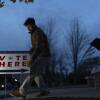This conversation has been edited for clarity.
Joe Mathieu: The violence in Charlottesville, Va., brought international attention to this past weekend's rally in Boston. This morning, we've listened to WGBH's Callie Crossley's commentary on violence during the rally in Charlottesville, and old hate in the context of modern times. She joins us now to reflect on this weekend's "free speech" rally in Boston, which drew tens of thousands for a broad protest against racist rhetoric. Good morning, Callie, thanks for being with us.
Callie Crossley: Good morning, Joe.
Joe Mathieu: Despite some scuffles, this weekend is being hailed as a success, a peaceful demonstration against hate. What's your thought?
Callie Crossley: It was very interesting because I was out of town watching it. And just to see the determination, the kind of texts I was getting from my friends, some of whom were marching, other people who were observing, about the power of being able to say, "This is not who we are." And, you know, Boston has that fraught racial history, still grappling with it. Just a few months since the Adam Jones incident and a lot of other, you know, reflections about who we are and can we ever get rid of that sort of racist Boston city moniker. And here was a whole group of people, very mixed group of people, coming from different parts of town in huge numbers to say, we don't want to be thought of that way. This is important enough that we show up in large numbers to reject what was shown in Charlottesville.
Joe Mathieu: It is no secret that Boston still struggles with racism, past and present. And I wonder, Callie, if you feel like the turnout on Saturday the way people behaved, the message is we saw change any of that? Is this evolving?
Callie Crossley: I think what people have to understand that when you're talking about issues of race and racism, and anti-Semitic hate, this is not a one time thing, not a two time thing. It keeps going, because there's always going to be small groups or even large groups who are intent on making that their chief focus. And so people have to understand coming out — however big numbers, and that was great — on Saturday to say, this is not who we are, is just the beginning. You sort of have to be ever-vigilant. And if you're not ever vigilant, then you risk what happened at Charlottesville, which was pretty scary for a number of reasons, not just because the death of Heather Heyer, but because of the images and what people were saying there in that march, holding up those, I call them, you know, torches. Some people call them tiki lights but they looked like torches to me.
Joe Mathieu: You know, to that end, Callie, I heard more than one person, usually a baby boomer or older say, we thought we fought this fight already.
Callie Crossley: Exactly. I listen to the veterans, who were on the shores of Normandy and elsewhere fighting against the Nazis, saying, "What's going on here? Is this what I sacrificed and watched my friends sacrifice for?" The key is to remain peaceful in the protest and to not allow some people that have other agendas to upstage what that message is all about.
Joe Mathieu: I would then ask you, in closing, Callie Crossley, what needs to happen next? What does Boston need to do to move forward and capitalize on what happened over the weekend?
Callie Crossley: Well, it's interesting, because, as I said, I was out of town, so I was here on Martha's Vineyard, and there was a kind of impromptu companion protest here, a statement by a small group of people. And what I [took away from this] is that in these small communities, as well as in Boston, you have to think about Boston as many small communities. You have to show up, and that's what one of the organizers here was saying. If you don't show up, and by that, again, I mean, on many occasions not just marching in the streets, but looking around to say, where are the pressure points and how can I relieve them? How can I — now that I am awake and see, and maybe I was always awake, but I just didn't want to see that some of this was [happening] in the way that it has been? What can I do, then, in any small way, to make certain that it stays under a rock, really, which is where it should be?
Joe Mathieu: WGBH's Callie Crossley talking with us after a weekend we will all remember for a long time. Callie, thank you for your take.
Callie Crossley: Thank you, Joe.





